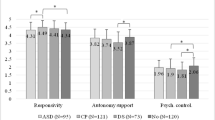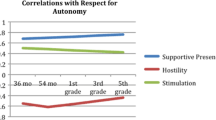Abstract
This study examined the extent to which child syndromes and observation context related to mothers’ parenting behaviors. Longitudinal observations were conducted of parenting behavior across ages 3, 4, and 5 years during structured and unstructured activities. The 183 participants included mothers of children with autism spectrum disorders, cerebral palsy, Down syndrome, undifferentiated developmental delay, or typical cognitive development. Negative parenting behaviors were higher in structured activities and higher in mothers of children in all developmentally delayed groups. Positive parenting was higher in unstructured activities and especially high for mothers of children with Down syndrome. Despite differences found through direct observation of parenting children in different diagnostic groups, they are not as strong as syndrome-group differences found through more commonly used self-report questionnaires assessing domains like parenting stress.


Similar content being viewed by others
References
Achenbach, T. M., & Rescorla, L. A. (2001). Manual for the ASEBA school-age forms and profiles. Burlington, VT: Research Center for Children, Youth, and Families, University of Vermont.
Adamson, L. B., Deckner, D. F., & Bakeman, R. (2010). Early interests and joint engagement in typical development, autism, and Down syndrome. Journal of Autism and Developmental Disorders, 40, 665–676.
Aicardi, J., & Bax, M. (1992). Cerebral palsy. In J. Aicardi (Ed.), Diseases of the nervous system in childhood (pp. 300–367). London: MacKeith.
American Psychiatric Association. (2000). Diagnostic and statistical manual of mental disorders (4th ed., Text Revision). Washington DC: Author.
Baker, J. K., & Crnic, K. A. (2009). Thinking about feelings: Emotion focus in the parenting of children with early developmental risk. Journal of Intellectual Disability Research, 53, 450–473.
Baker, J. K., Messinger, D. S., Lyons, K. K., & Grantz, C. J. (2010). A pilot study of maternal sensitivity in the context of emergent autism. Journal of Autism and Developmental Disorders, 40, 988–999.
Bayley, N. (1993). Bayley Scales of Infant Development: Manual (2nd ed.). San Antonio, TX: The Psychological Corporation.
Belsky, J., Crnic, K., & Woodworth, S. (1995). Personality and parenting: Exploring the mediating role of transient mood and daily hassles. Journal of Personality, 63, 905–929.
Belsky, J., Hsieh, K., & Crnic, K. (1998). Mothering, fathering, and infant negativity as antecedents of boys’ externalizing problems and inhibition at age 3 years: Differential susceptibility to rearing experience? Development and Psychopathology, 10, 301–319.
Bieberich, A. A., & Morgan, S. B. (1998). Brief report: Affective expression in children with autism or Down syndrome. Journal of Autism and Developmental Disorders, 28, 333–338.
Blacher, J., & McIntyre, L. L. (2006). Syndrome specificity and behavioural disorders in young adults with intellectual disability: Cultural differences in family impact. Journal of Intellectual Disability Research, 50, 184–198.
Bornstein, M. H. (1989). Between caretakers and their young: Two modes of interaction and their consequences for cognitive growth. In M. H. Bornstein & J. S. Bruner (Eds.), Interaction in human development (pp. 197–214). Hillsdale, NJ: Erlbaum.
Brophy-Herb, H. E., Schiffman, R. F., Bocknek, E. L., Dupuis, S. B., Fitzgerald, H. E., Horodynski, M., et al. (2011). Toddlers’ social-emotional competence in the contexts of maternal emotion socialization and contingent responsiveness in a low-income sample. Social Development, 20, 73–92.
Crnic, K. A., Gaze, C., & Hoffman, C. (2005). Cumulative parenting stress across the preschool period: Relations to maternal parenting and child behaviour at age 5. Infant and Child Development, 14, 117–132.
Crnic, K., Pedersen y Arbona, A., Baker, B. L., & Blacher, J. (2009). Mothers and fathers together: Contrasts in parenting across preschool to early school age in children with developmental delays. In L. M. Glidden & M. M. Seltzer (Eds.), International review of research in mental retardation (Vol. 37, pp. 3–30). Chennai: Elsevier.
Cyr, C., Dubois-Comtois, K., & Moss, E. (2008). Mother-child conversations and attachment of children in the pre-school period. Canadian Journal of Behavioural Science, 40, 140–152.
Dabrowska, A., & Pisula, E. (2010). Parenting stress and coping styles in mothers and fathers of pre-school children with autism and Down syndrome. Journal of Intellectual Disability Research, 54, 266–280.
Davis, N. O., & Carter, A. S. (2008). Parenting stress in mothers and fathers of toddlers with autism spectrum disorders: Associations with child characteristics. Journal of Autism and Developmental Disorders, 38, 1278–1291.
Doussard-Roosevelt, J. A., Joe, C. M., Bazhenova, O. V., & Porges, S. W. (2003). Mother–child interaction in autistic and nonautistic children: Characteristics of maternal approach behaviors and child social responses. Development and Psychopathology, 15, 277–295.
Dykens, E. M., & Hodapp, R. M. (2001). Research in mental retardation: Toward an etiological approach. Journal of Child Psychology and Psychiatry, 42, 49–71.
Dykens, E. M., Hodapp, R. M., & Finucane, B. M. (2000). Genetics and mental retardation syndromes. Baltimore: Paul H. Brookes.
Eisenhower, A. S., Baker, B. L., & Blacher, J. (2005). Preschool children with intellectual disability: Syndrome specificity, behaviour problems, and maternal well-being. Journal of Intellectual Disability Research, 49, 657–671.
Fenning, R. M., Baker, J. K., Baker, B. L., & Crnic, K. A. (2007). Parenting children with borderline intellectual functioning: A unique risk population. American Journal on Intellectual and Developmental Disabilities, 112, 107–121.
Fidler, D. J. (2003). Parental vocalizations and perceived immaturity in Down syndrome. American Journal on Mental Retardation, 108, 425–434.
Fleiss, J., Cohen, J., & Everitt, B. (1969). Large sample standard errors of kappa and weighted kappa. Psychological Bulletin, 72, 323–327.
Gartstein, M. A., Crawford, J., & Robertson, C. D. (2008). Early markers of language and attention: Mutual contributions and the impact of parent-infant interactions. Child Psychiatry and Human Development, 39, 9–26.
Hastings, R. P., & Brown, T. (2002). Behavior problems of children with autism, parental self-efficacy, and mental health. American Journal on Mental Retardation, 107, 222–232.
Helff, C. M., & Glidden, L. M. (1998). More positive or less negative: Trends in research on adjustment of families rearing children with developmental disabilities. Mental Retardation, 36, 457–464.
Hodapp, R. M. (1997). Direct and indirect behavioral effects of different genetic disorders of mental retardation. American Journal on Mental Retardation, 102, 67–79.
Hodapp, R. M., Ly, T. M., Fidler, D. J., & Ricci, L. A. (2001). Less stress, more rewarding: Parenting children with Down syndrome. Parenting: Science and Practice, 1, 317–337.
Hoffman, C. D., Sweeney, D. P., Hodge, D., Lopez-Wagner, M. C., & Looney, L. (2009). Parenting stress and closeness: Mothers of typically developing children and mothers of children with autism. Focus on Autism and Other Developmental Disabilities, 24, 178–187.
Johnson-Glenberg, M. C., & Chapman, R. S. (2004). Predictors of parent-child language during novel task play: A comparison between typically developing children and individuals with Down syndrome. Journal of Intellectual Disability Research, 48, 225–238.
Kasari, C., Mundy, P., Yirmiya, N., & Sigman, M. (1990). Affect and attention in children with Down syndrome. American Journal on Mental Retardation, 95, 55–67.
Landry, S. H., Smith, K. E., Swank, P. R., & Milller-Loncar, C. L. (2000). Early maternal and child influence on children’s later independent cognitive and social functioning. Child Development, 71, 358–375.
Lemanek, K. L., Stone, W. L., & Fishel, P. T. (1993). Parent-child interactions in handicapped preschoolers: The relation between parent behaviors and compliance. Journal of Clinical Child Psychology, 22, 68–77.
Lord, C., Risi, S., Lambrecht, L., Cook, E. H., Leventhal, B. L., DiLavore, P. C., et al. (2000). The Autism Diagnostic Observation Schedule—Generic: A standard measure of social and communication deficits associated with the spectrum of autism. Journal of Autism and Developmental Disorders, 30, 205–223.
Lord, C., Rutter, M., DiLavore, P. C., & Risi, S. (2001). The Autism Diagnostic Observation Schedule (ADOS). Los Angeles, CA: Western Psychological Services.
McIntyre, L. L., Blacher, J., & Baker, B. L. (2006). The transition to school: Adaptation in young children with and without developmental disability. The Journal of Intellectual Disability Research, 50, 349–361.
Morris, A. S., Silk, J. S., Steinberg, L., Myers, S. S., & Robinson, L. R. (2007). The role of family context in the development of emotional regulation. Social Development, 16, 361–388.
Pennington, L., & McConachie, H. (2001). Interaction between children with cerebral palsy and their mothers: The effects of speech intelligibility. International Journal of Language & Communication Disorders, 36, 371–393.
Pianta, R. C., & Stuhlman, M. W. (2004). Teacher–child relationships and children’s success in the first years of school. School Psychology Review, 33(3), 444–458.
Ruble, L., McDuffie, A., King, A. S., & Lorenz, D. (2008). Caregiver responsiveness and social interaction behaviors of young children with autism. Topics in Early Childhood Special Education, 28, 158–170.
Rutgers, A. H., van IJzendoorn, N. H., Bakermans-Kranenburg, M. J., Swinkels, S. H. N., van Daalen, E., Dietz, C., et al. (2007). Autism, attachment and parenting: A comparison of children with autism spectrum disorder, mental retardation, language disorder, and non-clinical children. Journal of Abnormal Child Psychology, 35, 859–870.
Scarr, S., & McCartney, K. (1983). How people make their own environments: A theory of genotype-environment effects. Child Development, 54, 424–435.
Siller, M., & Sigman, M. (2002). The behaviors of parents of children with autism predict the subsequent development of their children’s communication. Journal of Autism and Developmental Disorders, 32, 77–89.
Slonims, V., Cox, A., & McConachie, H. (2006). Analysis of mother-infant interaction in infants with Down syndrome and typically developing infants. American Journal on Mental Retardation, 111, 273–289.
Stoneman, Z. (2007). Examining the Down syndrome advantage: Mothers and fathers of young children with disabilities. Journal of Intellectual Disability Research, 51, 1006–1017.
Tehee, E., Honan, R., & Hevey, D. (2009). Factors contributing to stress in parents of individuals with autism spectrum disorders. Journal of Applied Research in Intellectual Disabilities, 22, 34–42.
Venuti, P., DeFalco, S., Giusti, Z., & Bornstein, M. H. (2008). Play and emotional availability in young children with Down syndrome. Infant Mental Health Journal, 29, 133–152.
Warren, S. F., & Brady, N. D. (2007). The role of maternal responsivity in the development of children with intellectual disabilities. Mental Retardation and Developmental Disabilities Research Reviews, 13, 330–338.
Yoder, P. J., & Warren, S. F. (2001). Intentional communication elicits language-facilitating maternal responses in dyads with children who have developmental disabilities. American Journal on Mental Retardation, 106, 327–335.
Acknowledgments
This paper was based on the activities of the Collaborative Family Study, supported by the Eunice Kennedy Shriver National Institute of Child Health and Human Development, Grant number: 34879-1459 (Drs. Bruce L. Baker, Jan Blacher, and Keith Crnic PIs). We are indebted to our staff, to the doctoral students who worked on this study, and to the families who participated in this longitudinal research. Support was also provided by the SEARCH Family Autism Resource Center in the Graduate School of Education, UC Riverside. Araksia Kaladjian.
Author information
Authors and Affiliations
Corresponding author
Rights and permissions
About this article
Cite this article
Blacher, J., Baker, B.L. & Kaladjian, A. Syndrome Specificity and Mother–Child Interactions: Examining Positive and Negative Parenting Across Contexts and Time. J Autism Dev Disord 43, 761–774 (2013). https://doi.org/10.1007/s10803-012-1605-x
Published:
Issue Date:
DOI: https://doi.org/10.1007/s10803-012-1605-x




